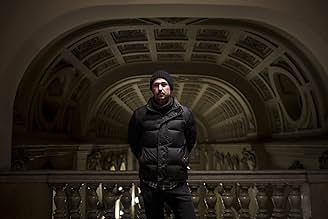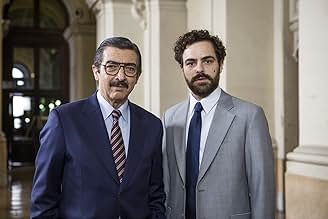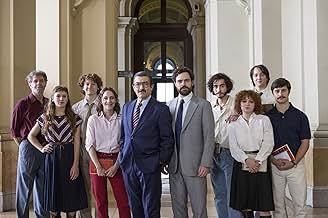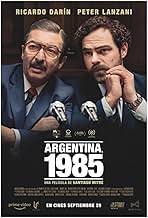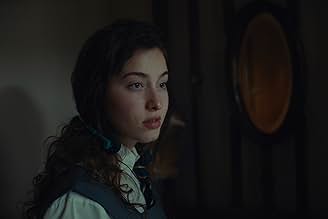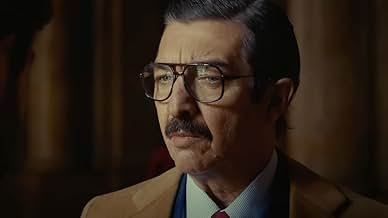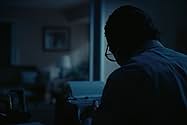ÉVALUATION IMDb
7,6/10
35 k
MA NOTE
Une équipe d'avocats s'attaque aux chefs de la dictature militaire sanglante de l'Argentine des années 1980 dans une bataille contre vents et marées et une course contre-la-montre.Une équipe d'avocats s'attaque aux chefs de la dictature militaire sanglante de l'Argentine des années 1980 dans une bataille contre vents et marées et une course contre-la-montre.Une équipe d'avocats s'attaque aux chefs de la dictature militaire sanglante de l'Argentine des années 1980 dans une bataille contre vents et marées et une course contre-la-montre.
- Director
- Writers
- Stars
- Nommé pour 1 oscar
- 49 victoires et 45 nominations au total
Gabriel Martín Fernández
- Bruzzo
- (as Gabriel Fernández)
Sommaire
Reviewers say 'Argentina, 1985' is a powerful film exploring Argentina's military dictatorship trial. It is lauded for strong performances, especially Ricardo Darín, and its emotional engagement. Critics appreciate the balance of tension, humor, and historical accuracy, though some find lacking depth in character development and context. The cinematography and direction effectively capture the era's atmosphere. Despite minor critiques on pacing and bias, it is seen as an important, impactful work resonating with audiences familiar with Argentina's history.
Avis en vedette
Argentina 1985 and a prosecutor pursues cases against powerful people who were involved in disappearances and murders during the earlier military dictatorship in Argentina.
This is a skilful and earnest political thriller which deals with real events. It took me a while to engage with this film, and I think it would probably have a lot more impact if you are either Argentinian or if you have a deeper knowledge of the events portrayed. It's all very effectively done but is perhaps a bit too long winded and talky at times, so could have done with a more punchy script and little more economic direction. As a comparison, the classic Greek political thriller 'Z' came to mind, and although it's nowhere near as good as that great film, this is a compelling stuff, and definitely it's a story that needed telling.
This is a skilful and earnest political thriller which deals with real events. It took me a while to engage with this film, and I think it would probably have a lot more impact if you are either Argentinian or if you have a deeper knowledge of the events portrayed. It's all very effectively done but is perhaps a bit too long winded and talky at times, so could have done with a more punchy script and little more economic direction. As a comparison, the classic Greek political thriller 'Z' came to mind, and although it's nowhere near as good as that great film, this is a compelling stuff, and definitely it's a story that needed telling.
You've been tasked to prosecute the fascist junta, they've been pulled into the court from their safe bunker, air force, navy and army, assortments of corrupt parties, but you'll feel like you're the hunted, not the hunter.
You'd be forgiven for thinking Ricardo Darin appears in most of the films of Argentine cinema if you only come across the features that receive international acclaim, but there's a good reason for that, and once again he delivers an impressive performance as the state prosecutor building a team and a case against those that destroyed thousands of lives during their vicious and brutal reign.
Coming in well over two hours, I wouldn't let that put you off as the tension builds and insurmountable barriers are removed, the time flies by. A fine piece of factual story telling that leaves more than a sense of satisfaction at the end.
You'd be forgiven for thinking Ricardo Darin appears in most of the films of Argentine cinema if you only come across the features that receive international acclaim, but there's a good reason for that, and once again he delivers an impressive performance as the state prosecutor building a team and a case against those that destroyed thousands of lives during their vicious and brutal reign.
Coming in well over two hours, I wouldn't let that put you off as the tension builds and insurmountable barriers are removed, the time flies by. A fine piece of factual story telling that leaves more than a sense of satisfaction at the end.
It's not easy to talk about one of the darkest periods in Argentina's history - including torture, rapes and deaths - and to do it in an appealing way that doesn't become too heavy or exploit the victims' suffering in an abusive way. It's not easy, but they did it.
The script by Llinás and Miter is quite refined, careful and intelligent in the way it addresses all the atrocities of the regime, always saying what it has to say, but it is also intelligent in the way it incorporates moments of humour, a personal and familiar dimension that helps us to identify with the characters, being able to transform everything that happened in one of the most important judgments in history into hope and a turning point. I'm not Argentine. I'm not an easy tear person. However, it is difficult to contain emotions in certain depositions or when in his closing arguments, prosecutor Straessera says "Nunca más" (Never Again). People who have lived under dictatorial regimes or who have heard the stories told by their parents or grandparents cannot remain indifferent to such a moment.
Santiago Miter's direction is super smart too. It's filmed soberly when necessary. It's filmed using movement and different techniques when the action requires it, such as in moments of greater tension, such as during a harrowing dinner with the Assistant Attorney, Luis Moreno Ocampo. The editing is also very efficient, helping a 140-minute film on such a heavy topic - and with much of its time spent in an investigation or in court - pass quickly, using several scenes on the screen at the same time, resorting to overlapping voices and testimonies, resorting to music whenever the film has something to extract from it, not seeming to do anything by chance.
Finally, it is impossible not to mention the excellent actors who make this film. All the supporting actors are at a good level, but the dynamic between Ricardo Darin (as the Attorney General) and Peter Lanzani (as the Assistant Attorney) is one of the highlights, always seeming true and honest, being easy to sympathize and cheer for those characters. Darin could very well have taken a more showy approach, but it is his sobriety and distinct personality that are his greatest strengths.
A must-see film for anyone who cares about the human condition and dignity. A film that recalls that certain pages of history must never be lived again. Nunca más!
The script by Llinás and Miter is quite refined, careful and intelligent in the way it addresses all the atrocities of the regime, always saying what it has to say, but it is also intelligent in the way it incorporates moments of humour, a personal and familiar dimension that helps us to identify with the characters, being able to transform everything that happened in one of the most important judgments in history into hope and a turning point. I'm not Argentine. I'm not an easy tear person. However, it is difficult to contain emotions in certain depositions or when in his closing arguments, prosecutor Straessera says "Nunca más" (Never Again). People who have lived under dictatorial regimes or who have heard the stories told by their parents or grandparents cannot remain indifferent to such a moment.
Santiago Miter's direction is super smart too. It's filmed soberly when necessary. It's filmed using movement and different techniques when the action requires it, such as in moments of greater tension, such as during a harrowing dinner with the Assistant Attorney, Luis Moreno Ocampo. The editing is also very efficient, helping a 140-minute film on such a heavy topic - and with much of its time spent in an investigation or in court - pass quickly, using several scenes on the screen at the same time, resorting to overlapping voices and testimonies, resorting to music whenever the film has something to extract from it, not seeming to do anything by chance.
Finally, it is impossible not to mention the excellent actors who make this film. All the supporting actors are at a good level, but the dynamic between Ricardo Darin (as the Attorney General) and Peter Lanzani (as the Assistant Attorney) is one of the highlights, always seeming true and honest, being easy to sympathize and cheer for those characters. Darin could very well have taken a more showy approach, but it is his sobriety and distinct personality that are his greatest strengths.
A must-see film for anyone who cares about the human condition and dignity. A film that recalls that certain pages of history must never be lived again. Nunca más!
A bracingly riveting legal drama that sheds informative light on the historic Trial of the Juntas and the painstaking work that went into its preparation, Argentina, 1985 narrates the strategy of the attorney chosen to prosecute the ones responsible for the bloodiest dictatorship in Argentine history. Smartly crafted & strongly acted, the film is engrossing for the most part yet not realised to its full potential.
Co-written & directed by Santiago Mitre, the story covers the legal challenges & constant death threats that the lead prosecutor faces along with his personal demons while preparing the case. The courtroom proceedings are shot with finesse, those real-life testimonies provide a powerful, disturbing & heartbreaking account of the brutality of the dictatorial regime and they happen to be provocative enough to rile up viewers' emotions.
Despite the grim subject matter, humour surfaces on screen in the most unlikely of ways and is effectively carried out. But the plot also loses momentum every time it shifts focus from the main event to protagonist's own family life. Also, the prosecution team hardly faces any friction in the courtroom, for the back-n-forth plays that make this genre so captivating is missing here. But as expected, Ricardo Darín leads from the front with an assured input.
Overall, Argentina, 1985 illustrates the political climate of its period setting in meticulous detail and makes for a gripping dramatisation of a vital slice of Argentine history. Still, there was more up for grabs as despite the 140 mins runtime, the film feels like a surface level exploration than an in-depth investigation. Strengthened by top-notch performances from its cast & first-rate work from the crew, this Argentine offering ranks amongst the better films of 2022 and is a must-see.
Co-written & directed by Santiago Mitre, the story covers the legal challenges & constant death threats that the lead prosecutor faces along with his personal demons while preparing the case. The courtroom proceedings are shot with finesse, those real-life testimonies provide a powerful, disturbing & heartbreaking account of the brutality of the dictatorial regime and they happen to be provocative enough to rile up viewers' emotions.
Despite the grim subject matter, humour surfaces on screen in the most unlikely of ways and is effectively carried out. But the plot also loses momentum every time it shifts focus from the main event to protagonist's own family life. Also, the prosecution team hardly faces any friction in the courtroom, for the back-n-forth plays that make this genre so captivating is missing here. But as expected, Ricardo Darín leads from the front with an assured input.
Overall, Argentina, 1985 illustrates the political climate of its period setting in meticulous detail and makes for a gripping dramatisation of a vital slice of Argentine history. Still, there was more up for grabs as despite the 140 mins runtime, the film feels like a surface level exploration than an in-depth investigation. Strengthened by top-notch performances from its cast & first-rate work from the crew, this Argentine offering ranks amongst the better films of 2022 and is a must-see.
Argentina, 1985 is inspired by the true story of the prosecutors Julio Strassera and Luis Moreno Ocampo, who in 1985 dared to investigate and prosecute those responsible for the bloodiest phase of the Argentine military dictatorship, which fell only 2 years earlier. Without being intimidated by the regime, the expert Strassera and the young Moreno Ocampo formed a young legal team of unlikely heroes to wage an unequal battle.
Constantly threatened, together with their families, they fought against time to give justice to the victims of the military junta which in 1976 deposed Isabelita Martinez De Peron in a coup. The members of the junta were tried for crimes committed by the Armed Forces in those years, which resulted in over 30,000 disappeared in December 1985, many were sentenced to life imprisonment. The film has the advantage of effectively reconstructing, in the same places where the facts took place, the difficult investigative work and the four-month trial with 833 eyewitnesses and survivors of clandestine detention and torture centers.
Also using a surprisingly humorous tone, which makes the magistrate (played by an extraordinary Ricardo Darìn) more human, likeable his very young group of lawyers and affectionate his beautiful family reveals the private side of an honest man. The 1985 trial allowed the Argentine justice to recognize and reclaim a long denied right. It inaugurates democracy and condemns the use of violence as a possibility.
When state terrorism takes hold in society, there is always an attempt to annihilate citizens and eliminate the possibility of communication.
Constantly threatened, together with their families, they fought against time to give justice to the victims of the military junta which in 1976 deposed Isabelita Martinez De Peron in a coup. The members of the junta were tried for crimes committed by the Armed Forces in those years, which resulted in over 30,000 disappeared in December 1985, many were sentenced to life imprisonment. The film has the advantage of effectively reconstructing, in the same places where the facts took place, the difficult investigative work and the four-month trial with 833 eyewitnesses and survivors of clandestine detention and torture centers.
Also using a surprisingly humorous tone, which makes the magistrate (played by an extraordinary Ricardo Darìn) more human, likeable his very young group of lawyers and affectionate his beautiful family reveals the private side of an honest man. The 1985 trial allowed the Argentine justice to recognize and reclaim a long denied right. It inaugurates democracy and condemns the use of violence as a possibility.
When state terrorism takes hold in society, there is always an attempt to annihilate citizens and eliminate the possibility of communication.
Le saviez-vous
- AnecdotesAfter winning the Golden Globe for best non-English language film, fellow actor Peter Lanzani revealed that Ricardo Darín used his "lucky charm" for awards ceremonies and told the cast and crew to think, "Don't worry, we're not going to win, we have no chance, we're losers, be calm, we won't have to make a speech, we won't win."
- Gaffes(at around 43 mins) The taxis of the time had a logo in the shape of a circle with an identification number on the front door. In this scene the taxis don't have any logo except the taxi sign on the roof.
- Citations
Julio César Strassera: History was not made by guys like me.
- Générique farfeluPhotographs from the trial are shown in the credits.
- ConnexionsFeatured in Javo & Temoc: Top 10 Películas: Lo "mejor" del año (2022)
- Bandes originalesSalir de la melancolía
Written by Charly García (as Carlos Alberto 'Charly' García)
Performed by Serú Girán
Meilleurs choix
Connectez-vous pour évaluer et surveiller les recommandations personnalisées
- How long is Argentina, 1985?Propulsé par Alexa
Détails
- Date de sortie
- Pays d’origine
- Langues
- Aussi connu sous le nom de
- Аргентина, 1985
- Lieux de tournage
- sociétés de production
- Consultez plus de crédits d'entreprise sur IMDbPro
Box-office
- Brut – à l'échelle mondiale
- 905 893 $ US
- Durée
- 2h 20m(140 min)
- Couleur
- Rapport de forme
- 1.50 : 1
Contribuer à cette page
Suggérer une modification ou ajouter du contenu manquant







